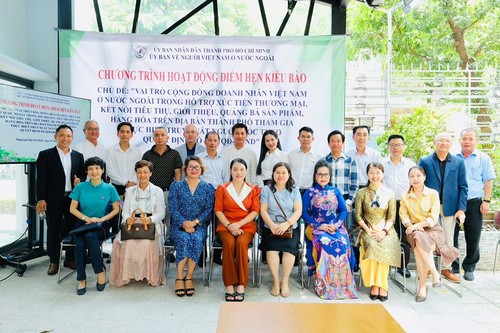
The Overseas Vietnamese Rendezvous Point program held in HCMC in July connected domestic enterprises and overseas Vietnamese business-people. (Photo: M.P.)
|
Dr. Le Hoang The, an environmental scientist working in Japan and Director of The VOS Ecosystem Company, has introduced Lingzhi (reishi) products to the consumer network Amazon. He called product traceability an "ID card" that foreign consumers can put their trust in.
“To be able to export products from Vietnam to the US market, domestic exporters must confirm that all products are certified, have patents, and are tested at each stage. And exporters must be familiar with US standards,” said The.
Food supplements, for example, must have organic ingredients and reveal which laboratories they were tested by and by which standards. Products must be trademarked so no one can copy them, said The.
Nguyen Ngoc Luan, CEO of the Global Trading Connection Company, known for its instant coffee brand Meet More Coffee, insists that his company's products have a firm foothold in foreign markets thanks to strict compliance with the origin of goods regulations in those countries.
He noted, “The first thing we do is apply the ISO process – prepare all documents and text for each shipment so we can encode it later on the portal with a QR code. Businesses must invest in internal controls to ensure quality management.”

Nguyen Ngoc Luan, a Vietnamese living in Australia and CEO of the Global Trading Connection Company (Photo: Ngoc Xuan)
|
Meet More products are available in many supermarkets and small stores nationwide. By meeting the strictest export standards, they are also available in 20 foreign markets including India, Japan, South Korea, the US, and Australia.
Many businesses have invested in traceability, including training human resources to use tracing technology and establishing a system to record and check data.
Do Tu Trace, Director of External Relations for the Blue Saigon Company, says they have done their best to ensure traceability by using QR codes.
“We set up a team to use traceability apps, and we’ve received great support from other companies in applying the standards established by suppliers, manufacturers, and import partners,” Do Tu Trace told VOV.
Origin traceability is mandatory when supplying goods to world markets. Vietnamese farm produce can only be exported to China, Japan, South Korea, the US, and the European Union when they meet the import country’s traceability regulations. Import countries have been increasing the number of rules in their regulatory systems.
Luong Minh Huan, Director of the Enterprise Development Institute, says traceability is a way to demonstrate a business’s transparency and commitment to the quality and origin of its products.
“Traceability helps to prove that products and goods meet quality, safety, and environmental standards set by international organizations. This builds trust from business partners and consumers, promotes trade relationships, and creates a competitive advantage in international markets,” Huan noted.
Vietnam has deeply integrated into the global economy by participating in new-generation free trade agreements. To compete effectively, affirm the quality of Vietnamese goods in foreign markets, and win consumers’ trust, enterprises must keep renewing themselves and fully meet the strictest standards of the import markets.